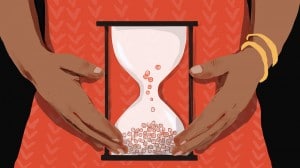
In order to determine if egg freezing is a good choice for them, all Shady Grove Fertility egg freezing patients have measured their reproductive hormone levels via ovarian reserve testing.
This week, NPR Health reported on the ovarian reserve test—a test that impacted Shady Grove Fertility patient, Samantha Margolis, and her decision to freeze her eggs. Earlier this year, Samantha learned that both her mother and grandmother went through early menopause, which was concerning because studies show that there is a genetic component to the age at which a woman goes through menopause. Generally, fertility starts declining more quickly after the age of 35, and after 40, the rates of natural conception are very low. For women experiencing early or premature menopause, their ability to conceive naturally declines at an earlier age.
So when Samantha, age 36, received the news from her physician, Kate Devine, M.D. (Shady Grove Fertility’s Washington, D.C. – K Street Office), that her egg supply score was lower than anticipated, she was alarmed.
At first, Samantha wasn’t sure what to do—should she freeze now, or wait? Dr. Devine provided her with some honest feedback and encouragement, “I’m not an alarmist, but I would do this, and I would do it as soon as you can. I wouldn’t wait.”
The results of the testing led Samantha to wish she had been able to test her ovarian reserve at a younger age with her gynecologist.
Why isn’t ovarian reserve testing part of standard gynecological care?
Part of the reason this test hasn’t been incorporated as a standard of care is that the hormone levels measured to evaluate the ovarian reserve are not always evaluated consistently and can differ depending on where you go. And the fact that studies have also shown that there can be a lot of variability in test results, even for the same samples from the same woman, Dr. Benjamin Leader, fertility diagnostics researcher and CEO of ReproSource, attributes the variation to different labs having different methods and not calibrating their results to the same clinical outcomes.
For Shady Grove Fertility, the solution is ReproSource. The Ovarian Assessment Report provided by ReproSource measures egg supply by assessing several reproductive hormones against the woman’s age in order to determine if her egg supply is good, normal, or poor. It is the first ovarian assessment that calibrates test results in a consistent, well-controlled environment. Because of their streamlined process, ReproSource is able to provide the most reliable test for women who wish to check their egg supply and their fertility.
Looking back now, Samantha said that at a certain age she wished this ovarian reserve test was part of your annual gynecologic exam. “There’s no question that if I would have had this test earlier and known what my count was that I would have done this [egg freezing] years ago.”
Click to read the full article “Women Find A Fertility Test Isn’t As Reliable As They’d Like “.
If you are interested in learning more about testing your ovarian reserve click to schedule an appointment with a Shady Grove Fertility physician or call 1-877-411-9292.





